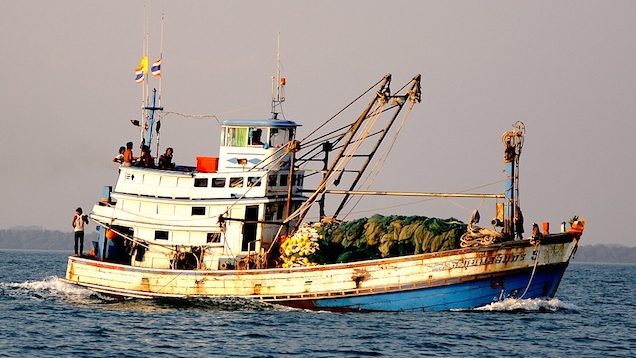Four years ago, the shocking revelation that thousands of migrant fishermen from Myanmar, Thailand, Cambodia, and Laos were being trafficked to remote Indonesian waters aboard Thai fishing vessels made headlines around the world.
Thai NGOs, including the Labor Rights Promotion Network (LPN), played an essential role in repatriating victims from the Indonesian islands of Ambon, Tuan, and Benjina.
Now, over 100 of the rescued fishermen have come together to form the Thai and Migrant Fishers Union Group (TMFG) to help prevent their fellow countrymen from falling victim to forced labor and exploitation at sea.
For the past three years the group has helped demand justice for other migrant workers whose employers fail to comply with Thai labor laws as well as provided legal and employment advice.
The Bangkok Post reports:
Speaking at a forum on anti-human trafficking efforts and national reform at Chulalongkorn University, Chairat Ratchapaksi, a Phetchaburi man who was among those forced to work off the Indonesian islands, said that after that nightmare experience, he and other migrants from Laos, Myanmar and Cambodia, had joined hands to assist their fellows under the TMFG banner.
He said the union was focused on the plight of migrant labourers who often bear the brunt of forced labour and human trafficking.
A number of them were duped by job recruiters who sold them to foreign employers. Their travel documents and work permits were often forged and their passports were confiscated after the boats set sail.
After being rescued, the former fisherman said he felt reborn and pledged to put all his efforts into helping his peers as he believed human trafficking remained a huge problem in the industry.
Another survivor, Win Za Tun, from Myanmar said that he worked on a fishing boat in Indonesia for six years, where he worked 20 hours a day for a mere 100 Baht daily wage. When Win asked for late or unpaid wages, his employer threatened to shoot him. He said he was unable to escape because the captain was close with state authorities and other vessel owners.
He now works as a volunteer translator for LPN and TMFG, visiting schools, factories, and courts to share his story and give advice to fellow migrant workers.
Chairat added that more needs to be done to support victims of human trafficking. “We are humans and labourers who must be granted basic rights from the state including benefits and protection.”







Freedom United is interested in hearing from our community and welcomes relevant, informed comments, advice, and insights that advance the conversation around our campaigns and advocacy. We value inclusivity and respect within our community. To be approved, your comments should be civil.